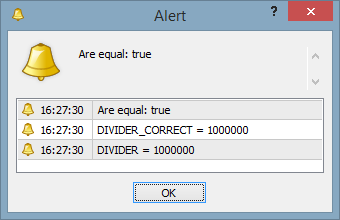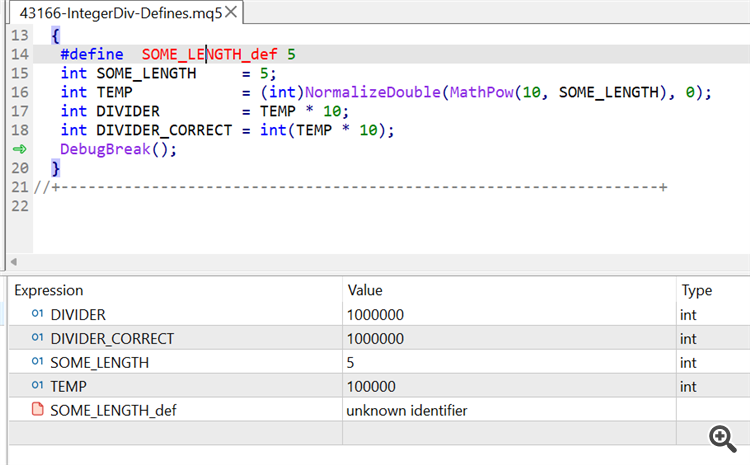While the values are equal:
#property strict #define SOME_LENGTH 5 #define TEMP (int)NormalizeDouble(MathPow(10, SOME_LENGTH), 0) #define DIVIDER TEMP * 10 #define DIVIDER_CORRECT int(TEMP * 10) void OnStart() { Alert("DIVIDER = ", DIVIDER); Alert("DIVIDER_CORRECT = ", DIVIDER_CORRECT); Alert("Are equal: ", DIVIDER == DIVIDER_CORRECT); }

The reason is because you are using macros without properly isolating your values and the rules of precedence take over
someIntegerValue / DIVIDER -> someIntegerValue / TEMP * 10 -> ( someIntegerValue / TEMP ) * 10
When using macros, always isolate your values.
#define DIVIDER ( TEMP * 10 )
| Your code | #define DIVIDER TEMP * 10 Alert("using DIVIDER: ", someIntegerValue / DIVIDER); |
| This means | (12345678 / TEMP)*10 |
| It does not mean | 12345678 / (TEMP * 10) |
If you insist on using #defines make sure the definition is one token
#define DIVIDER (TEMP * 10)
I understand, thank you very much
And just to add to that, I suggest using variables in this case.
Macro definitions are useful in many situations, but variables have the advantage of being visible in the debugger during runtime, so less ambiguity/guesswork.
You can inspect the actual values like so :
And just to add to that, I suggest using variables in this case.
Macro definitions are useful in many situations, but variables have the advantage of being visible in the debugger during runtime, so less ambiguity/guesswork.
You can inspect the actual values like so :
Yes, that's what I did
I just use global "const int/string/double" instead of "#define"
Thanks
- Free trading apps
- Over 8,000 signals for copying
- Economic news for exploring financial markets
You agree to website policy and terms of use

Can anybody please tell me why the results are different? What is the reason?